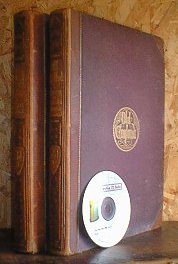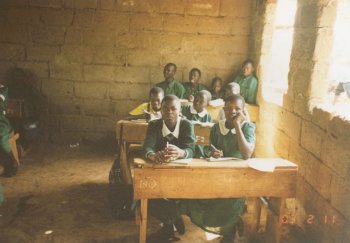| How fortunate are we?
Here we are, enjoying the benefits of comfortable homes, good food, and luxuries
such as computers and the internet, and not the least, good education for
our children.
We think nothing about spending £14.00 on a CD of an old book, and here
at Archive CD Books I am prepared to buy expensive equipment, and old books
costing many hundreds of pounds.
Not everyone in the world is so fortunate. We've all seen examples on the
television, and at times, it brings a lump to our throats and tears to our
eyes.
What happens there in third world countries when the TV crews have gone home,
and we get on with our lives?
Those people we have seen stay there, and get on with their lives too.
A small donation can make a huge difference, especially if that donation
is made direct and not soaked up by administrative costs.
|
|
This class room at Dago Kokore Primary School is pretty dire - at least
by our standards.
The floor is bare mud, and becomes totally soggy in wet weather. Heavy red
mud. The walls of the building are made from home made mud blocks, dried
in the sun. The windows and door are just openings in the walls. Nothing
is secure, and no resources can be left in the class room. The desks and
benches are made from the kind of scrap wood that one finds in the yard.
However, the teachers at the school are wonderfully dedicated, and the pupils,
aged 7 to 14 really want to learn. They know that with a good
education that they can improve their future and that of their families.
So, with conditions like this, we would like to help. Last year we helped
provide a water tank for the school, and contributed £500 towards its
cost. The project was a great success. This year we would like to contribute
towards improving the conditions of one of the class rooms, or perhaps more
of them if we can raise enough money.
What we want to do is:
-
Make concrete floors
-
Plaster the walls
-
Fit a door and real windows
-
Provide some decent desks and chairs
There is a way that we can do this. By selling one of our best CDs. And instead
of selling it at £17.87 (£21.00 Including VAT on sales within the
UK), we are going to offer it at just £10.00 - and - the WHOLE
£10.00 will go direct to the school to pay for this class room project.
We need to sell 60 CDs. You can help - really easily!
That was the plan....
Update February 2005
We succeeded! And More!!
We reached the 60 CD sales really easily, and £600 was sent over to
the Dago Kokore School. They didn't waste any time in buying cement and ordering
windows and a door for Diana's class room. In fact, with the money, they
were able to concrete the floors in all of the class rooms!
They are so proud of their school and its improvements, and as a direct result
of the fact that they have shown themselves as wanting to improve, and
have spent money that we sent wisely on classroom improvements, the British
Council in Kenya have given them a new set of school gates. That's a real
status symbol for them! So there has been a knock-on effect.
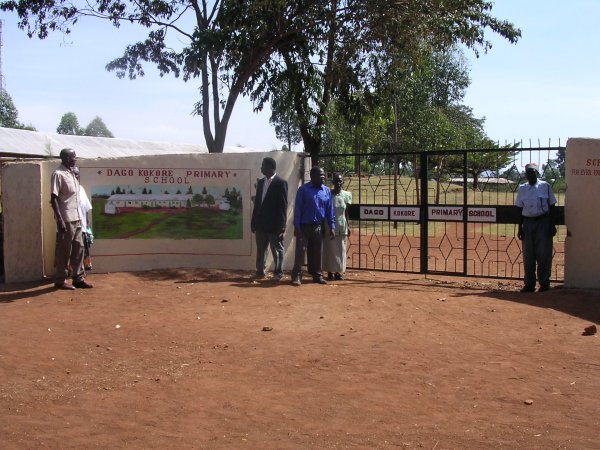
Below: Diana's class room, and the one beside it, now has a windows and a
door. Until now, there were just openings in the walls.
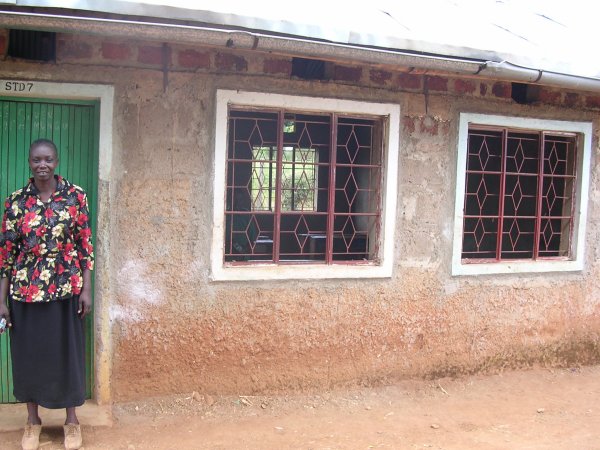
Below: Diana (left) in her class room - with concrete floor.
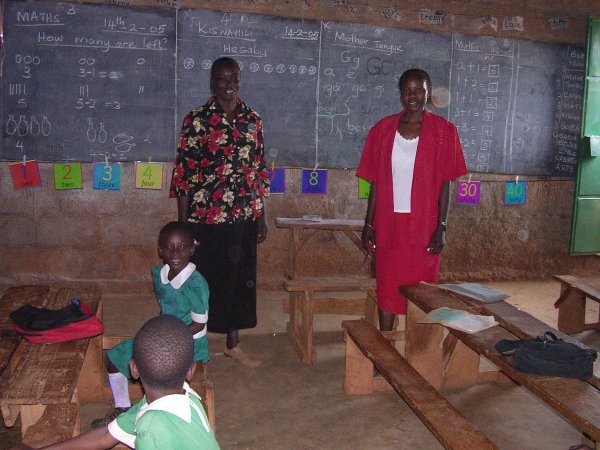
Note also the number cards, given to her by the Ruardean Primary School.
The Dago Kokore school simply cannot afford such luxuries. In 2004 Archive
CD books also supplied hundreds of pencils and plastic rulers for the children.
They cost us little (in our terms), but the passport to schooling is for
a child to own their own pencil.
Below: some photos of the children in the class rooms. All with concrete
floors rather than the bare mud.
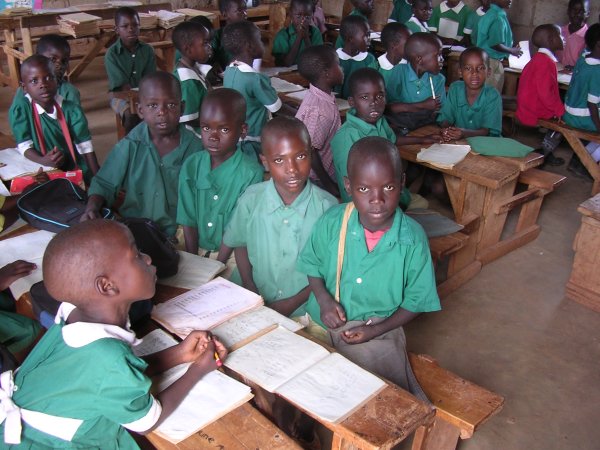
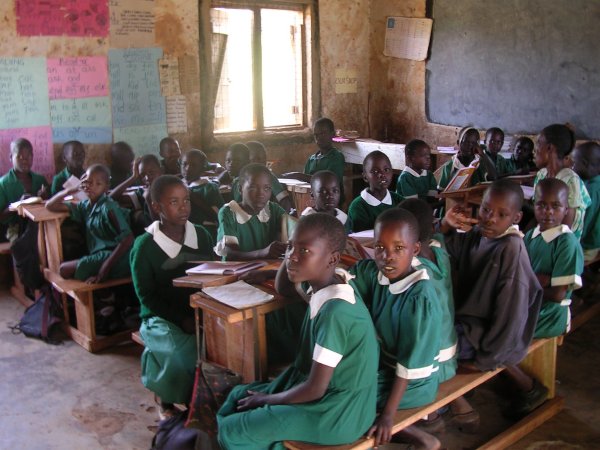
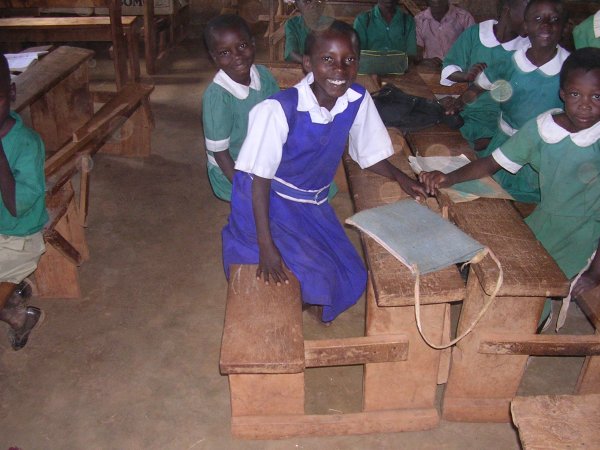
The chairs and desks were made by parents some years ago.
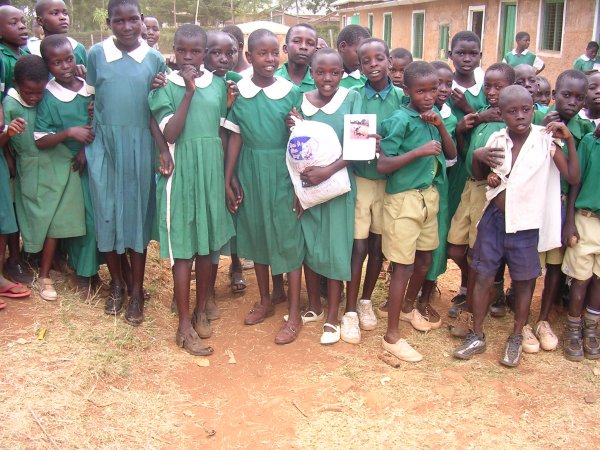
Above: another success story. The children all now have shoes! (Look at the
little guy on the right in the white shirt sporting a pair of Nike trainers).
Having shoes is really important. Its a health issue too, as here in this
part of Africa there is a nasty little worm that burrows in to the sole of
your foot, and then wraps itself up the inside of your leg as it grows. These
children were coming to school without shoes, and so hundreds of second hand
shoes were collected in a project by our local school, the Ruardean Primary
School, and taken over there.
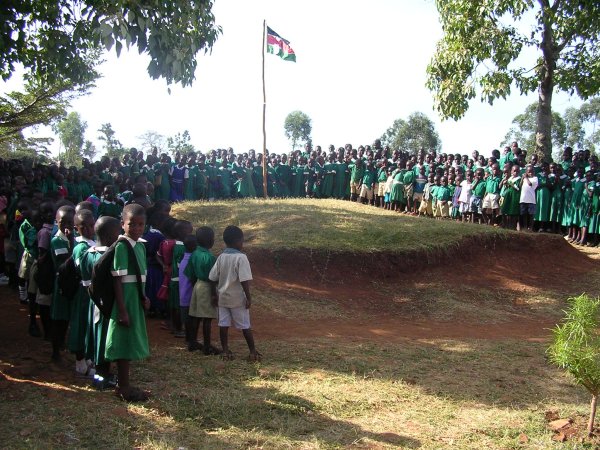
Above: School assembly. It takes place outdoors. That's the only place large
enough to hold the whole group.
Education in Kenya is in three stages:
-
Infant (they call it "nursery") school for 3 to 7 year olds - that is not
free. Only parents who can afford it can send their children to infant school
- and of course, that is few. The infant classes at Dago Kokore School (with
100 children in three classes) meet in the local church. That's a very small
building with just one room, and everything has to be cleared out at the
weekends and whenever there is a mid-week church meeting.
-
Primary School - for 7 to 14 year olds (although some children stay on a
year or so later sometimes if they have not reached the basic standard grade
of education). That's the school that you see here. Primary school education
is now paid for by the Kenyan Government.
-
Secondary School - for over 14's. That has to be paid for by parents, and
at massive fees of £110 ($200) per year few parents can afford that,
and generally, it is for the boys. That's a cultural thing. There is a secondary
school close by. There is another type of secondary school, of a higher standard,
but that is a boarding school some 60 miles away, where pupils achieve a
higher standard of education that may lead to a University place, but attending
such a school is virtually out of the question at over £200 per year.
Putting that into perspective, a teacher earns about £60 per month,
and that is a highly paid job. Parents of these children earn little or nothing
- that's even if the children still have parents. About 70% of them don't,
due to the AIDS epidemic.
But the amazing thing, is that these children want to work in school.
They have an immense desire to succeed in school. They see education as the
way of leading to a job and supporting their extended families. And they
are happy young people!
Our little bit in 2004 helped a little, by improving the school conditions.
It isn't much really, but it is something that the children, staff and governors
of the school are immensely thankful for. In fact they are over the moon
about it! £600 to them is a small fortune.
But it doesn't stop there! In total, from the sale of that one CD, we didn't
raise just £600 - we raised £3,000 !
See here what the plans are for 2005 and the
rest of the money.
|

